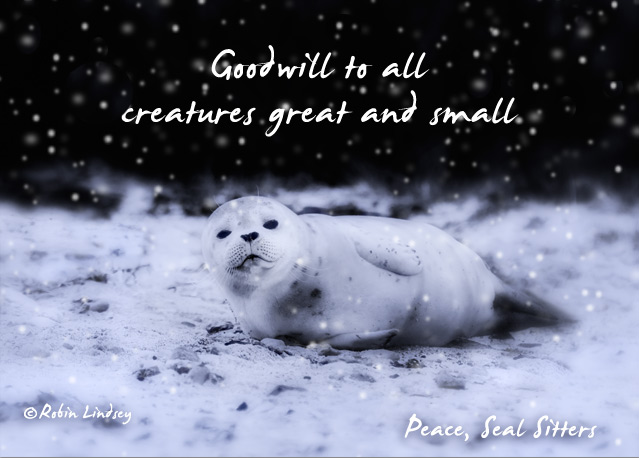Dec 2016
Rain can't dampen Seal Sitters' spirits watching over a seal pup
Dec/29/16 06:41 PM
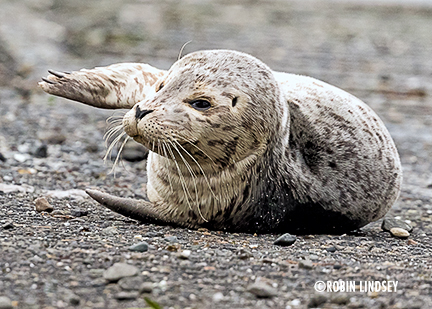
The 3-6 month old pup was discovered asleep on the grooved cement ramp by First Responder David, on his way into downtown Seattle around 7am. The ramp, with its easy access and docks that attract small bait fish, has proven popular with pups over the years and volunteers drive through and check the location on a regular basis. Unfortunately, it is a dangerous destination since cars, trucks and boats - and people walking dogs - regularly pass by and a sleeping or sick pup could easily be injured.
David grabbed cones and barricades out of his car and taped a buffer zone around the area. Lynn arrived within minutes and Volunteer Scheduler Jonel checked the calendar to see which volunteers had entered in early hours. A steady stream of volunteers began arriving as soon as 7:30. Several boats were retrieved and launched near the pup’s resting spot. Boaters were more than cooperative, as volunteers directed incoming boats to the dockside away from the pup and pedestrians around the various trucks, trailers and vessels. The pup was alert to the activity, but managed to get in a number of naps in between.
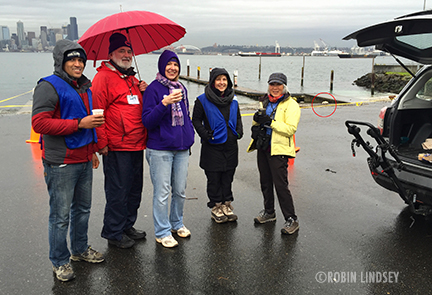
Young Seal Sitters volunteers Cyrilla and Rydian named the boat ramp pup Flame, very appropriate for this season of candles and light. Because of the holidays, some of our volunteers were free to help out and several visitors from out of town were able to see their very first harbor seal.
Flame snoozed off and on all afternoon, despite all the traffic and onlookers just 30 feet away. Volunteers had their own version of a tailgate party as they sipped coffee to stay warm - though the sight of Flame was enough to keep all of us warm and fuzzy, lifting our spirits on an otherwise dreary day.
The pup moved down to the water’s edge around 3:20 and finally swam off into Elliott Bay at 4pm. After waiting to make sure Flame didn’t return, volunteers packed up materials and headed home, satisfied that they had ensured the pup’s safety today.
Volunteers celebrate Solstice on the beach
Dec/21/16 08:20 PM
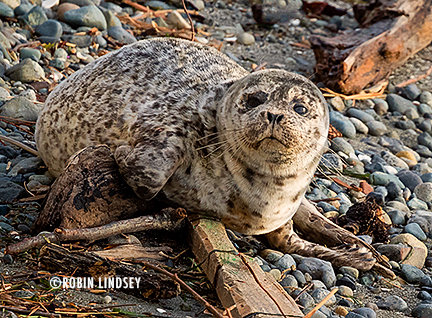
Late this morning, Seal Sitters celebrated the arrival of a harbor seal pup who came to rest on a West Seattle beach and enjoy every bit of lingering sunlight. The hotline received a call about a pup close to the sea wall on a public beach, just above the high tide line.
Yellow tape was strung, signs were posted by first responders and volunteers began to arrive. Appropriately enough, the alert pup was nicknamed Solstice.
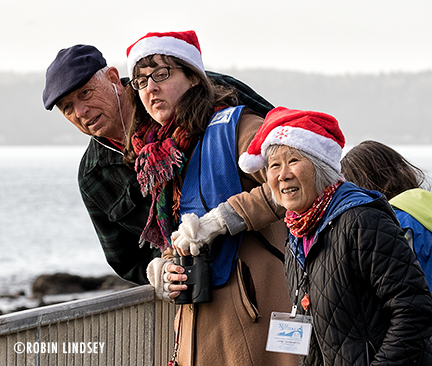
Solstice appeared in reasonably good health, but potentially has blindness in one eye. Seals can forage quite successfully, however, with limited vision and even complete blindness. Used to navigating and foraging in dark, murky waters, they use their whiskers (vibrissae), each of which contains up to 1,500 nerves, to locate prey by sensing vibrations up to 600 feet away. Seals have the amazing ability to determine the size (within 1.4 inches) and shape of prey with this technique. Read the German scientific study here.
Seal Sitters volunteers stayed until well after dark in brisk temperatures until Solstice finally flopped across the pebbled beach, back toward the cold waters of Puget Sound. After more than a month-long drought in seal pup responses, volunteers were thrilled to help keep Solstice safe while on shore.
